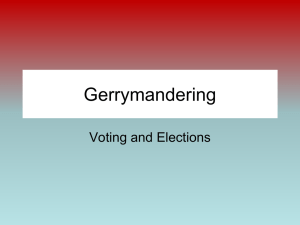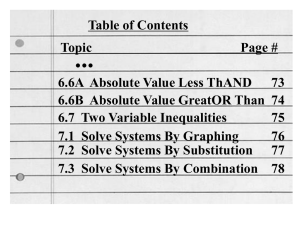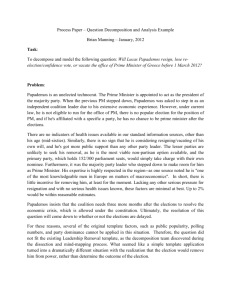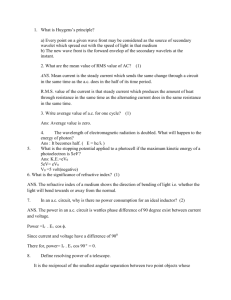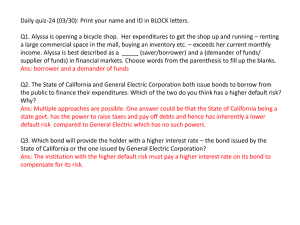POLITICAL PARTIES 11. Why do we need political parties? Explain
advertisement
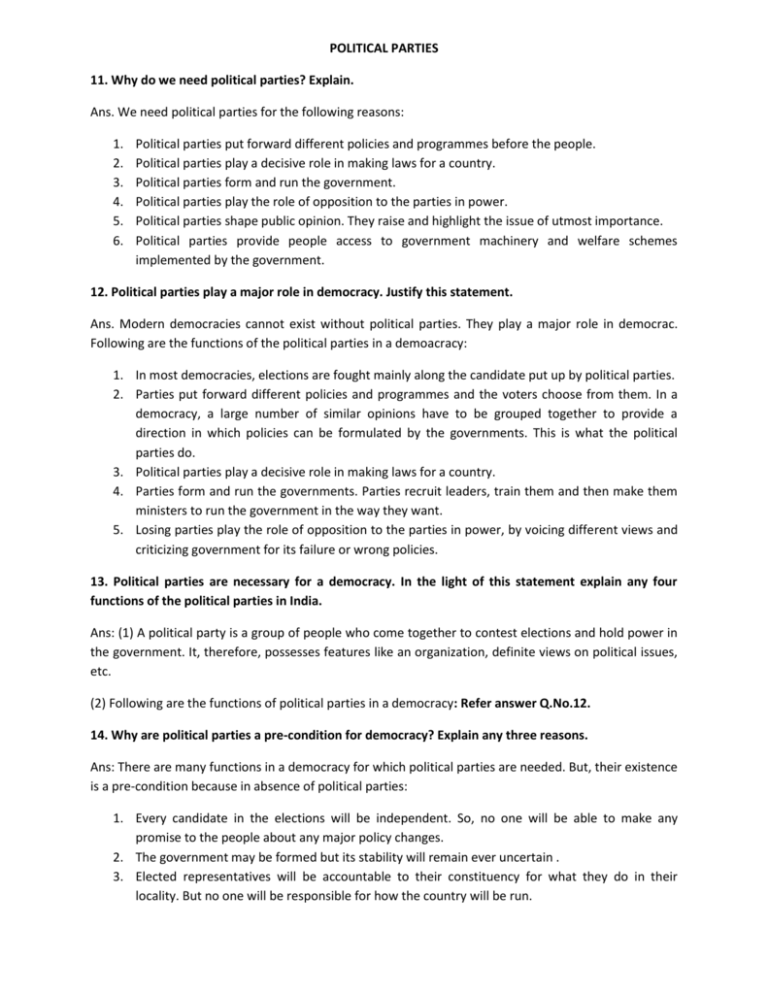
POLITICAL PARTIES 11. Why do we need political parties? Explain. Ans. We need political parties for the following reasons: 1. 2. 3. 4. 5. 6. Political parties put forward different policies and programmes before the people. Political parties play a decisive role in making laws for a country. Political parties form and run the government. Political parties play the role of opposition to the parties in power. Political parties shape public opinion. They raise and highlight the issue of utmost importance. Political parties provide people access to government machinery and welfare schemes implemented by the government. 12. Political parties play a major role in democracy. Justify this statement. Ans. Modern democracies cannot exist without political parties. They play a major role in democrac. Following are the functions of the political parties in a demoacracy: 1. In most democracies, elections are fought mainly along the candidate put up by political parties. 2. Parties put forward different policies and programmes and the voters choose from them. In a democracy, a large number of similar opinions have to be grouped together to provide a direction in which policies can be formulated by the governments. This is what the political parties do. 3. Political parties play a decisive role in making laws for a country. 4. Parties form and run the governments. Parties recruit leaders, train them and then make them ministers to run the government in the way they want. 5. Losing parties play the role of opposition to the parties in power, by voicing different views and criticizing government for its failure or wrong policies. 13. Political parties are necessary for a democracy. In the light of this statement explain any four functions of the political parties in India. Ans: (1) A political party is a group of people who come together to contest elections and hold power in the government. It, therefore, possesses features like an organization, definite views on political issues, etc. (2) Following are the functions of political parties in a democracy: Refer answer Q.No.12. 14. Why are political parties a pre-condition for democracy? Explain any three reasons. Ans: There are many functions in a democracy for which political parties are needed. But, their existence is a pre-condition because in absence of political parties: 1. Every candidate in the elections will be independent. So, no one will be able to make any promise to the people about any major policy changes. 2. The government may be formed but its stability will remain ever uncertain . 3. Elected representatives will be accountable to their constituency for what they do in their locality. But no one will be responsible for how the country will be run. 15. Explain the role of opposition party in a democracy. Ans. Those parties that lose in the election play the role of opposition to the parties in power. The opposition party plays following important roles in a democracy: 1. It voices those views which are different from the party which enjoys power. So, there are alternatives to chose from. 2. It criticizes the government for its wrong policies and programmes and their implementation. 3. It criticizes the government for its failure. 4. It mobilises opposition to the government. 5. It keeps people at large, aware of government’s wrong policies and programmes. 6. It acts as a check and balance against the government. 16. Examine the role of political parties in India. Ans: The role o political parties can be demarcated in to the following: 1. Before elections: (i) Before elections parties unite like-minded people who belong to diverse backgrounds and thus, form a wide coalition of people and give unity in diversity. (ii) They seek to provide the highest common denominator. They aggregate and articulate public opinion. (iii) They educate, instruct, mobilize and activate the electorate. 2. After elections: (i) The party which gets the majority of votes, forms the government as ruling party and works for the welfare of the people. The party which gets the minority of votes forms the oppositions and checks the government inside the parliament by debates, question hour etc. (ii) Political parties provide social support, structure to governmental policies and programmes. 17. Critically examine the working of political parties in four points. Ans.(1) Lack of internal democracy: Most of the political parties do not practice democratic values within the party itself. They do not hold organizational elections regularly. (2) Dynastic succession: It has been such that for years a family had overshadowed the party. Like kingship, the leadership of the party is also being transferred from one generation of a family to another. (3) Growing role of money and muscle power: The political parties give tickets to rich and powerful men. They use money and power to win elections. (4) No material choice for the worker: The people Is left with no choice. Almost all parties have more or less same policy and programmes. (5) Opportunistic politics: It has been seen in modern times that for their own benefit and other favours the parties, exchange their hands by throwing away their policies and the programmes. 18. State the different party systems existing in various countries. Give one example of each system. Ans. In democratic countries world over, there exists a number of part systems. The major party systems include-mono-party system, bi-party system and multi-party system. (1) Mono-party system: In this system, the government is always formed by the same single party. It does not mean that other parties are not allowed, legally speaking, people are free to form political parties but it does not happen because the electoral system does not permit for free competition for power. Communist Party in China provides an example of such type of party system. (2) Bi-party or Two-party system: In bi-party system, power usually changes between two main parties. Several other parties may exist, contest elections and win a few seats in the national legislature. But only the two main parties have a serious chance of winning majority of seats to form government. The United States of America and the United Kingdom are examples of biparty system. (3) Multi-party system: If several parties compete for power, and more than two parties have a reasonable chance of coming to power either on their own strength or in alliance with others, we call it a multi-party system. In India, we have a multi-party system. 19. Explain its two advantages and two disadvantages? Ans: (1) In a party system where power usually changes between two main parties. Several other parties may exist, contest elections and win a few seats in the national legislatures. But, only the two main parties have a serious chance of winning majority of seats to form government. Such a party system is called two-party system. The United State of America and the United Kingdom are examples of two-party system. (2) (i)Advantages: (a) The system leads to political stability in the country. (b) The electorate has a very clear choice before them. © It is easier to secure balance in the political system. (d) Opposition behaves in a more responsible and dignified manner. (ii) Disadvantages: (a) In the system, cabinet becomes somewhat despotic in nature. (b) The system lacks variety of interests and opinions to enjoy political representation. (c) The choice of alternative ideologies and policies is considerably limited in the system. 20. About hundred years ago there were a few countries that had hardly any political party. Now, there are a few countries that do not have political parties. Examine this statement. (1) Political parties act as vehicles of federal sharing of political power and as negotiators of social divisions in the arena of democratic politics. (2) Modern democracies cannot exist without political parties. The rise of political parties is directly linked to the emergence of representative democracies. (3) As societies has become large and complex, they also need some agency to gather different views on various issues and to present these to the government. (4) They need some ways to bring various representatives together so that a responsible government could be formed. (5) They need a mechanism to support or restrain the government, make policies, justify or oppose them. Political parties fulfill these needs that every representative government has. In this way, we can say that parties are a necessary condition for a democracy. 21. No party system is ideal for all countries and in all situations. Justify the statement with five arguments. Ans. For the following reasons, it can be said that no party system is ideal for all countries and in all situations: (1) Party system is not something that country can choose. (2) This system evolves over a long time, depending on the nature of society, its social and regional divisions, its history of politics and its system of elections. (3) The party system in a country cannot be changed quickly. (4) Each country develops a party system that is conditioned by its special circumstances. (5) Sometimes, social and geographical diversity also shape the system. In a large country like India, its diverse nature cannot be absorbed by two or even three parties. So, it is true to say that there is not ideal party system that would be ideal for all countries and all situations. 22. Differentiate between mono-party and bi-party systems. Give an example for each type. Mono-party system Bi-party system 1. The system in which a single party is 1. The system in which the power is permitted to rule, is called mono-party transferred between only two major party, system. is called bi-party system. 2. In mono-party system, although people 2. In bi-party system, several parties may are free to form political parties, but it exist, contest election and win few seats does not happen because the electoral but only the two main parties have the system does not permit free competition serious chance of winning majority of for power . seats required to form the government. 3. In china, there exists a mono-party system 3. In the USA, there exists a bi-party system, in which only the Communist Party always in which the power is transferred between forms the government. the Republican and Democratic Parties. 23. Describe various ways of classifying the political system and the political parties. Ans. (1) Ways for classifying party system: The party system can be classified on the basis that how many parties are allowed to form, control and run the government. On this basis the party system can be classified into three categories: (i) (ii) Mono-party system: In this system only one party is allowed to control and run the government. Eg: China Bi-party system: In this system, however there may exist several parties but power is generally changed between only two major parties. Eg. USA, UK. (iii) Multi-party system: In this system several parties compete for power. Eg: India (2) Ways for classifying of political parties: (i) On the basis of presence: (a) National Parties: These parties operate their functions country-wide. They have their units in various states. But by and large, all these units follow the same policies, programmes and strategy that is decided at the national level. (b) State Party: These parties do not operate their functions nation-wide. They keep their activities to a region or few states. (ii) On the basis of proportion of votes and seats: (a) National Party: A party that secures at least six per cent of the total votes in the Lok Sabha elections or Assembly elections in four states and win at least four seats in the Lok Sabha is recognized as a national party. (b) State Party: A party that secures at least six per cent of total votes in an election to the legislative assembly of a state and wins at least two seats is recognized as a state party. 24. State any two advantages of the multi-party system. In what way is an alliance different from a coalition government? Ans. (1) Following are the advantages of the multi-party system: (i) (ii) It allows a variety of interests ad opinions to enjoy political representation. People representing different interests and opinions learn to accommodate each other and share power when they form alliance or coalition. (2) Alliance and coalition government are different from each other in the following ways. i) ii) Alliance When several parties join hands for the purpose of contesting elections, it is called an alliance. Example: The national Democratic Alliance (NDA) (i) (ii) Coalition When no single party gets a clear majority in the election and the government is formed by two or more parties coming together. Example: The previous coalition government (UPA) led by Congress Party at the centre. 24. What is a multi-party system? Explain merits and demerits of multi-party system. Ans. (1) A party system in which more than two parties compete for power and have reasonable chance of coming to power, either on their own strength or in alliance with others, is called multi-party system. (2) Merits: (i) This system allows a variety of interests and opinions. (ii) In this system, people have to make a choice between several candidates. Demerits: (i) This system appears a mess. (ii) This system leads to political instability. 25. State the conditions as laid down by the Election Commission to recognize a ‘State Party” and ‘National Party’? Ans. (1) Every party in the country has to register with the Election Commission. The election commission has laid down detailed criteria of the proportion of votes and seats that a party must get in order to be a recognized party. (2) State Party : A party that secures at least six per cent of the total votes in an election to the Legislative Assembly of a State and wins at least two seats is recognized as a state party. (3) National Party: A party that secures at least six per cent of the total votes in the Lok Sabha election or Assembly elections in four states and wins at least four seats in the Lok Sabha is recognized as a national party. 26. Which National Political Party draws inspiration from the teachings of Mahatma Phule? Write any four points related to its policy. Ans. (1) Bahujan Samaj party formed in 1984 under the leadership of Kanshi Ram, draws inspiration from the ideas and teachings of Sahu Maharaj, Mahatma Phule, Periyar Ramaswami Naicker and Babasaheb Ambedkar. (2) The following are the main policies of the party. (i) Seeks to represent and secure power for the bahujan samaj which includes the dalits, adivasis, OBCs and religious minorities. (ii) Stands for the cause of securing the interests and welfare of the dalits and pressed people. (iii) (iv) To work as a revolutionary social and economic movement of change with a view enunciated in the Constitution of India. To instill consciousness among not only the Dalits, but also among those belonging to other backward groups. 27. Why are symbols allotted to political parties in India? Explain the reasons. Ans: In India, every party has to register with the Election Commission. For the Commission, all parties are equal but it offers some special facilities to large and established parties. The symbol allotted by the Commission shows that: (1) (2) (3) (4) (5) The party is large and established. It has a well-organised presence in a large area. Only the official candidate of the party can use this symbol. The party that gets it, is recognized by the Commission. The party is either a national or a state party. 28. Differentiate between Bharatiya Janata Party and Indian National Congress in three points. Ans: Indian National Congress Bharatiya Janata Party 1. It is one of the oldest parties of the world. It was 1. It is a relatively new party. It was established in established in 1885. 1980s. 2. It believes in modern secular democratic republic 2. It believes in a strong and modern India which India. 3. In its ideological orientation, the INC is a centrist party. 4. This party espouses secularism and welfare of weaker sections and minorities. 5. It supports new economic reforms but with a human face. 6. It is happy with the status quo. 7. Congress does not think uniform civil code fit for the country. 3. 4. 5. 6. 7. derives its inspiration from its ancient culture and values. In its ideological orientation the BJP is a rightist party. It believes in cultural nationalism. It too believes in economic reform but opposes foreign investments in many fields. It wants full territorial and political integration of Jammu and Kashmir. It wants a uniform civil code for all people in the country. 29. State the necessary required by a party to be recognized as a regional/ State party. Ans: Following are the necessary conditions required by a party to be recognized as a regional/state policy. (1) A party is recongised as state/regional party by the Election Commission when it gets certain proportion of votes and certain number of seats in an election to the State Assembly. Only then any party becomes a recongised party. (2) To become a recognized regional party, it has to secure at least six per cent of the total vote cast in a state election. (3) Also, the party has to win at least two seats in the election. 30. Name the national political party (BJP) that gets inspiration from India’s ancient culture and values. (i) (ii) (iii) (iv) (v) (vi) (vii) It is a rightist party. It believes in cultural nationalism. It wants to build a strong and modern India that takes inspiration from its ancient culture and value. Hindutwa is important in its conception of Indian nationalism and politics. It wants full territorial and political integration of Jammu and Kashmir with culture with India. It believes in a uniform civil code for all people living in the country irrespective of religion. It wants a complete ban on religious conversions. 31. Differentiate between national and regional parties? Write any four points. National Party Regional Party 1. These parties have influence all over the 1. The influence of these parties is limited to country. particular region or state. 2. They deal mainly with national problems. 2. They are more concerned with the 3. The activities of national parties give problems and demands of a particular priority to the national problem. region only. 4. National parties have their presence in 3. The activities of regional parties are many states. restricted to the region or the sate in 5. For example, Congress, BJP which they function. 4. Regional parties are usually limited to their own region. 5. For Example, TDP, DMK. 32. Explain the meaning of a political party. Mention its components. Name any two recognized national parties in India. (1) Meaning: (i) A Political party is a group of people who come together to contest election and hold power in government. (ii) They agree on some policies and programmes for the society with a view to promote the collective good. (iii) Since there can be different views on what is good for all, parties try to persuade people as to why their policies are better than others. They seek to implement these policies by winning popular support through elections. (2) Components of Political Parties: (i) The leaders, (ii) The active members, (iii) The followers or supporters. (3) National Political Parties: (i) Indian National Congress, (ii) BJP (iii) CPI (iv) CPM (v) National Congress Party (vi) Bahujan Samaj Party. 33. How is dynastic succession the major challenge for political parties in India? Explain. Ans: The dynastic succession is a major challenge for political parties in India and it affects the functioning of the political parties adversely in the following ways: (1) The dynastic succession does not allow political parties to practice open and transparent procedures for their functioning. And, there is a limited scope for an ordinary worker to rise to the top in a party. (2) In such a party, the leaders are in a position to favour the people close to them or even their family members. (3) The top positions in the party are always controlled b members of one family which is unfair to other members of that party. (4) There is concentration of power in one or few leaders at the top. 34. What are the challenges to political parties? Ans :Political parties face following challenges in order to remain effective instruments of democracy: (i) There is lack of internal democracy within parties. In all political parties, there is a tendency towards the concentration of power in one or few leaders at the top. (ii) The growing role of money and muscle power in parties, especially during elelctions is another challenge faced by the political parties. Parties tend to use short cut methods for winning elections. (iii)Due to lack of ideological differences among parties, parties do not seem to offer a meaningful choice to the voters. (iv)The dynastic succession does not allow political parties to practice open and transparent procedures for their functioning and there are very few ways for an ordinary worker to rise to the top in a party. 35. Explain any five challenges which the political parties face. Ans: (1) Lack of internal democracy: (i) All over the world there is a tendency in political parties towards the concentration of powers in one or few leaders at the top. (ii)Parties do not keep membership registers, do not hold organizational meetings and do not conduct internal elections regularly. (2) Dynastic succession: (i) Most political parties do not practice open and transparent procedures for their functioning. (ii) The senior members of the party are in a position of unfair advantage to favour people close to them or even their family members. (3)Use of money and muscle power: (i) Parties use money and muscle powers especially during elections. They tend to use short-cuts to win elections. (ii) Rich people and companies who give funds to the parties, tend to have influence on the policies and decision of the party. (4)Absence of meaningful choice: (i) Very often parties do not seem to offer a meaningful choice to the voters. (ii) In our country, the differences among all the major parties on the economic policies have reduced. Those who really like different policies, have no option available to them. 36. Parties often face the challenge of lack of meaningful choice. Explain the statement with examples. Ans: (1) In a democratic country, there may be many political parties who contest election to form government. But, it is generally seen that they have more or less similar programmes and policies that they offer to the people. This leads to a situation when the voters feel that they do not have enough choice what they actually require to choose from. This situation connotes to lack of meaningful choice to the voters. (2) In order to offer a meaningful choice to the voters, parties must be significantly different in their policies, programmes etc. (3) In recent years there has been a decline in the ideological differences among parties in most parts of the world. (4) It is seen that political parties agree on more fundamental aspects but differ only in details how policies are to e implemented. (5) In India, the differences among all the major parties on the economic policies have reduced. 37. There is lack of internal democracy within the political parties. Justify the statement with three arguments. Ans: (1) There is the concentration of power in the hands of one or few leaders at the top. (2) Parties do not keep membership registers, do not hold organizational meetings and do not conduct internal elections regularly. (3) Ordinary members of the party do not get sufficient information on what happens inside the party. (4) They do not have means or the connections needed to influence the decisions. (5) As a result, the leaders assume greater power to make decisions in the name of the party. 38. State any three functions of the Election Commission of India? Ans (1) For the conduct of fair and impartial election the constitution provides for an independent body in the form of Election Commission which consists of Chief Election Commissioner and such other commissioners. (2) It performs the following functions: (i) It prepares electoral rolls for the election of Parliament, state legislatures as well local bodies. (ii) It supervises and controls the election machinery throughout the country, lays down general rules for election and issues notification of dates and schedules of election. (iii)It allots symbols and accords recognition to political parties. 39. Suggest any five measures to reform financial position of political parties in India? Ans: (1) It should be mandatory for political party to submit its audited annual financial statement. (2) It is mandatory for every candidate who contests elections to file an affidavit giving details of his/her property and criminal cases pending against him. (3) There should be state funding of elections. The government should give parties money to support their election expenses. (4) The financial account of every political party should be made public. These accounts should be examined by government auditors. (5) Citizens should be encouraged to give more donations to parties and to political workers. Such donations should be exempted from Income Tax thereby reducing the importance of big business houses in politics. 40. Suggest any five reforms to strengthen parties so that they may perform their functions well. Ans: Following reforms can be advised to strengthen parties so that they may perform their functions well: (1) To prevent defection, the law has been made so that if any MLA/MP changes his/her party, he/she will lose his/her seat in the legislature. (2) It has been made mandatory by the Supreme Court that ever candidate who is contesting and election, has to file an affidavit giving details of his/her property and criminal cases pending against him/her. (3) The Election Commission passed an order making it necessary for political parties to hold their organizational elections and file their Income Tax Returns. (4) A law should be made to regulate the internal affairs of political parties e.g. following constitution, maintaining register of its members, holding internal selections. (5) It should be made mandatory for the parties to give one-third of their party tickets to woman candidates. 41. Examine critically the role of an ordinary citizen in strengthening and deepening democracy. Ans: (1) Ordinary citizens can put pressure on political parties through petitions, publicity and agitations. (2) For this purpose, they can take help of pressure groups, movements and the media. (3) If the citizens do this effectively then in fear of losing public support by not taking reforms, the political parties would become more serious about reforms. (4) Also, there can be reforms, if those who want so join political parties. (5) We should not forget that the quality of democracy depends on the degree of public participation. 42. What is defection? What measures have been taken to curb it? 1. In order to gain some favour or power or money, it has been seen that MLAs and MPs change their parties. This changing of party by an elected representative is called defection. 2. Following are the measures taken to curb defection: (i) If any MLA/MP changes his/her party, he/she will lose the seat in the legislature. (ii) This new law has helped bring defection down. (iii) (iv) At the same time, this has made any dissent even more difficult. MPs and MLAs have to accept whatever the party leaders decide. 43. Describe the steps taken by the Supreme Court to counter the challenges faced by political parties. 1. Supreme Court passed on order to reduce the influence of money and criminals. 2. Now, it is mandatory for every candidate who contests elections to file an affidavit giving details of his property and criminal cases pending against him. 3. The new system has made a lot of information available to the public. So, the face of the contesting candidate is now open to voters that helps in taking decisions. 44. Explain the instances reflecting the efforts in India with the aim to reform political parties and leaders. Ans: Following are the instances reflecting the efforts in India with the aim to reform parties and leaders: 1. The constitution was amended to prevent elected MLAs and MPs from changing parties or defection. 2. The Supreme Court made it mandatory for every candidate to file an affidavit giving details of his property and criminal cases pending against him. 3. The Election Commission made it necessary for political parties to hold elections and file their Income Tax Returns. 4. The new system has made a lot of information available to the public. 4. Now, the public has been given the Right to Information. This has also proved an effective weapon. *****

